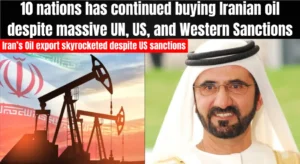1586 Views
France warned Trump against trying to invade Greenland by US military force or economic war
Trump fear Chinese Takeover of Panama Corridor, France Warns Trump steps to invade Greenland, Russia US trade corridor in Arctic & Atlantic ocean. France or NATO military in Greenland.
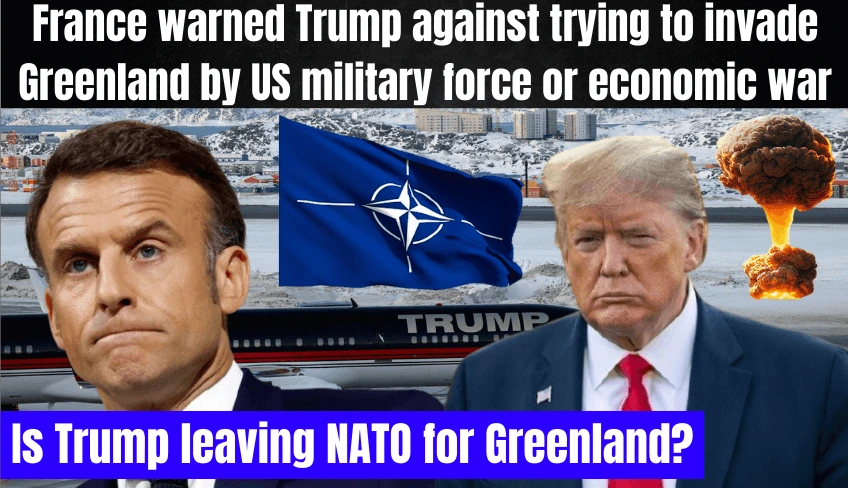
Recently, France says, US invasion of Greenland is Biggest shame on face of European countries. The President of France said that Trump is trying to make Greenland as a US autonomous region so that in the future the Arctic and Atlantic oceans can be connected to the American continent. French President Macron said that if Greenland is made an autonomous region of the US through US military and US economic restrictions, then France and NATO countries can also send their armies to Greenland through Denmark against the US. Anyway, there is a question in the minds of NATO countries whether Trump will ultimately achieve the goal of occupying Greenland because Greenland appears to be less important than Ukraine. But recently it has been reported that Trump is now fully prepared to capture Greenland, for which US officials have also landed in Greenland, due to which it is being said that Greenland can become a part of the US by the end of 2025. In fact, recently it has been told by the Biden Administration that the Panama corridor has completely gone into the hands of China, due to which Trump also wants Greenland, Canada and many islands should be made US autonomous regions so that there is no Chinese political and economic takeover in the future.
Why does Trump want to Deploy the US in Greenland troops after leaving the NATO treaty?
The United States’ interest in Greenland stems from several strategic, economic, and geopolitical factors. Recently a report has come out that if the US completely acquires Greenland, then in future, the complete focus will be on Russia-US trade, Greenland’s Natural Resources, Climate Change, Geopolitical interference, global surveillance and Arctic defense so that the US gets an opportunity to strengthen its interest in future NATO and Russia war.
- Strategic Military Position:
- Greenland’s location in the Arctic between North America and Europe makes it critical for Arctic defense and global surveillance. The Thule Air Base, established in 1943, is the U.S.’s northernmost military installation. It supports missile warning systems, space tracking, and serves as a hub for joint military exercises with NATO allies.
- As Arctic ice melts, new shipping routes like the Northern Sea Route could emerge, enhancing Greenland’s importance for controlling access to these corridors.
- Natural Resources:
- Greenland holds significant deposits of rare earth elements (essential for electronics, renewable energy tech, and defense systems) and minerals like zinc, iron ore, and uranium.
- Potential offshore oil and gas reserves, though underexplored, could become economically viable as ice retreats.
- Geopolitical Competition:
- The Arctic is increasingly contested, with Russia and China expanding their presence. Russia has militarized its Arctic coast, while China has sought investments in Greenland’s mining sector. The U.S. views Greenland as a key asset to counterbalance these powers in the region.
- Climate Change Implications:
- Melting ice accelerates access to resources and shipping lanes, raising Greenland’s economic and strategic value. The U.S. also collaborates on climate research through projects studying ice-sheet dynamics and sea-level rise.
- Historical Interest:
- The U.S. attempted to purchase Greenland from Denmark in 1946 and again under President Donald Trump in 2019, reflecting long-standing strategic ambitions. While Denmark rejected these offers, Greenland’s autonomy (granted in 2009) complicates future negotiations.
- Scientific Collaboration:
- Greenland’s environment provides unique opportunities for climate and atmospheric research, with U.S. institutions heavily involved in Arctic studies.
Challenges: U.S. interests must navigate Greenland’s self-governance and Denmark’s sovereignty, as well as local concerns about environmental impact and economic dependency. Greenlanders have resisted large-scale foreign projects, such as a controversial Chinese mining deal blocked in 2021. Greenland’s strategic Arctic location, resources, and role in great-power competition drive U.S. interest, though diplomatic and environmental considerations remain central to any engagement.

Thomas Massie demands the immediate seizure of Epstein-Linked Companies and Businesses in the US

Epstein Files are dragging Bitcoin into Political conflict without evidence that Bitcoin was made by Epstein or MIT

The Russian army is fighting the European Rothschild, not Ukraine, NATO, or US, World War III is exposed in the Epstein Files

SILVER CRASH? – China plans to resume exports of Silver by buying Copper, Aluminum and Palladium in 2026

France army is preparing to seize Russian oil tankers in the Mediterranean Sea and Bay of Biscay
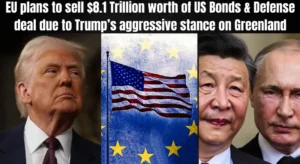
EU countries plan to sell $8.1 Trillion worth of US Bonds Trade and Defense deal due to Trump’s aggressive stance on Greenland

Israel is building a powerful air defense system to shoot down the Russian RS-28 Sarmat and the Chinese DF-41 nuclear missiles

Russia plans to transfer Oreshnik missiles to Venezuela, potentially strike American military factory

Chinese PLA will use Russian-made weapons against Taiwan and the US instead of its home made arms

Barron Trump will help Trump to occupy Greenland, US Military actions in Greenland, and the US-China Tariff war
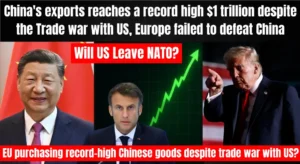
China’s exports reaches a record high $1 trillion despite the Trade war with US, Europe failed to defeat China

NATO nations betrayed Israel and the US for Russia’s new shipping and Economy corridor lanes in 2026

NVIDIA fears the loss of $1 trillion due to Foreign FDI moving into Huawei and OpenAI’s stakes

Mamdani will impose up to 5% taxes on $5 trillion wealthiest Pro-Israeli Jewish companies
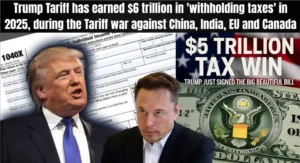
Trump Tariff has earned $6 trillion in ‘withholding taxes’ in 2025, during the Tariff war against China, India, EU and Canada
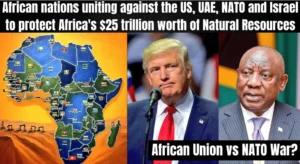
African nations uniting against the US, UAE, NATO and Israel to protect Africa’s $25 trillion worth of Natural Resources

China will save Russia’s $1 trillion Economy during Ukraine war by signing a mutual investment pact : Russia GDP Collapsed?

Iran become world’s first nation to detect Cancer, Kidney and cardiovascular disease using Nuclear medicine

BlackRock eying $14 trillion Venezuela natural resources, US-Maduro War, $26 trillion Ukraine mineral
